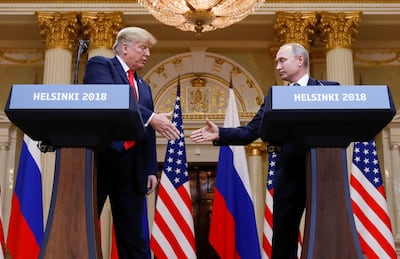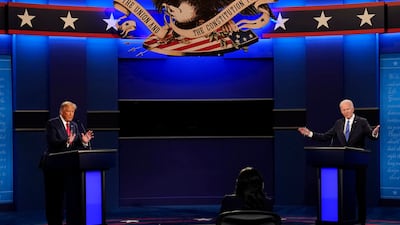The showdown between US President Joe Biden and his Republican rival Donald Trump is shaping up to be a national spectacle that will be “watched around the world.”
And although polls show that American voters rank the economy as their top election issue for the November 5 election, foreign policy is inching closer to centre stage, with growing chaos in the Middle East and partisan disputes over Russia's war in Ukraine.
CNN is hosting the prime time debate on Thursday at 9pm EST.
Mr Biden used the run-up to the debate against his right-wing populist adversary to try to deliver some major shows of diplomatic force.
His recent agenda included a D-Day anniversary trip to France, the G7 meeting in Italy with Washington's top western allies and Japan, securing a 10-year security agreement and $50 billion loan for Ukraine.
These were significant demonstrations of the traditional alliance structure the Biden administration has sought to uphold, contrasted against what Mr Biden says is Trump's embrace of “thugs like in North Korea” as well as Russia and China as “he pokes his finger in the eye of all of our allies".
At Thursday's debate, Mr Biden must defend his Middle East track record, which hawkish Republicans and the anti-Gaza war movement from the left have both criticised.
Trump will probably join a Republican chorus seeking to paint Mr Biden's posture on the world stage as weak.
House foreign affairs committee chairman Mike McCaul told The National that “while America is engaged in an all-out fight for the global balance of power, the Biden administration is projecting weakness and making the nation realise the desperate need for new leadership".
“Under President Biden, the US repeatedly fails to deter threats and protect US interests … our adversaries have only grown more emboldened and more determined in their efforts to see the US deteriorate,” he said.
Both candidates have asserted a strong support for Israel.
Despite statements of concern and condemnation from the Biden administration over civilian killings, the President has refused to substantively enforce his own “red line” on a Rafah invasion and continues to provide Israel with almost unfettered support.
Trump, who launched the landmark Abraham Accords during his time as president, has taken a more inflammatory tone.
He recently told donors that he would deport some pro-Palestinian student protesters from US university campuses, while also saying Israel is “losing the PR war” on Gaza and urging Prime Minister Benjamin Netanyahu to “get it over with fast".
EJ Kimball, director of policy and strategic operations at the US Israel Education Association, says that for debate watchers in favour of the Israel alliance “we're looking for a commitment that the United States will be a supporter for Israel on the global stage".
Mr Kimball said they will also be interested in questions to the candidates on how Washington is working to expand the Abraham Accords and “build out a broader Arab coalition, and how each of them will deal with the Iranian threat", as well as an outline of “what they view as essential for Palestinian governance.”
Americans have historically maintained steady and bipartisan support for Israel, and Capitol Hill remains one of its greatest sources of financial backing.
Since Gallup first measured opinions of Israel in 1989, an average of 65 per cent of Americans have had favourable opinions of it over the years.
But Israel's war in Gaza, which has killed more than 37,600 Palestinians since the October 7 Hamas attack that killed nearly 1,200 people in Israel, has begun to change that, particularly among younger voters.
Recent Gallup polling shows young adults hold the biggest decline in support of Israel, dropping from 64 per cent favourable among 18-34 year olds in 2023 to 38 per cent.
“I have had hard discussions with my parents who seem to be on the 'vote blue no matter what' train,” says Margaret Lavi, a Virginia voter and young mother who has normally voted for Democrats.
"I see a big difference in the generations on voting this year."
This year, she plans to join a growing movement of pro-Palestinian protest ballots in November over the war in Gaza – and she does not plan on watching the debate.
“There is nothing Biden could say that would sway me," Ms Lavi told The National.
"His actions over the last eight months and quite frankly his presidency have spoken louder than his words … his arrogance that young voters will continue to just vote 'blue' no matter what will be his downfall."
Mr Kimball, who works with bipartisan members of Congress to advance the US-Israel relationship, says opinions such as Ms Lavi's are “a minority” and he doubts that there is a significant splintering between Republicans and Democrats on Israel.
“This is going to be watched around the world, and including by our enemies and by Israel's enemies,” he said.
"A vital message that needs to be sent is that regardless of the outcome in November, the relationships between the US and Israel will be as strong as it's ever been.
On Ukraine, however, there are clearly diverging views between the two candidates.
The “war in Ukraine is not just local war between Russia and Ukraine, but this is a competition for the whole world rules,” says Tetiana Hranchak, a visiting Ukrainian professor at Syracuse University's Maxwell School of Citizenship and Public Affairs, who fled her country after Russia's 2022 invasion.
Mr Biden and Trump do not agree on those world rules.
Mr Biden has backed the delivery of military and financial support to Kyiv, calling Russian President Vladimir Putin a “dictator” who is threatening the world order and is intent on pushing the battle deeper into Europe.
Trump has faced years of scrutiny over his alleged ties with the Kremlin and was impeached during his first term over an alleged quid pro quo threat on support to Ukraine.
This year, he further caused controversy when he said he would encourage Russia to do “whatever the hell they want” to any Nato country that does not pay its dues.

While in France for the 80th anniversary of D-Day, Mr Biden nodded to his Republican opponent's diplomatic flirtation with Mr Putin, warning about “the price of unchecked tyranny".
This week, Reuters reported that two key Trump advisers have presented him with a plan to end Russia's war in Ukraine – if he wins the presidential election – that involves telling Kyiv it will only get more US weapons if it enters into peace talks with Moscow.
Ms Hranchak says she “will be nervous” about the debate because she does not “want Ukraine to be the subject of this ping-pong game".
“I wish that Ukraine ceases to be the subject of internal political struggle,” she said.
“In general, I'd like to hear answers or comments, not so much about Ukraine, but about Russia, because it's not Ukraine, but Russia, that poses the biggest challenge today, and it would be good to have a vision regarding the prospects of relations with Russia,” said Ms Hranchak.
“What exactly do we want to have in a result [of the war]? It depends on our vision of relations between the US and Russia.”


